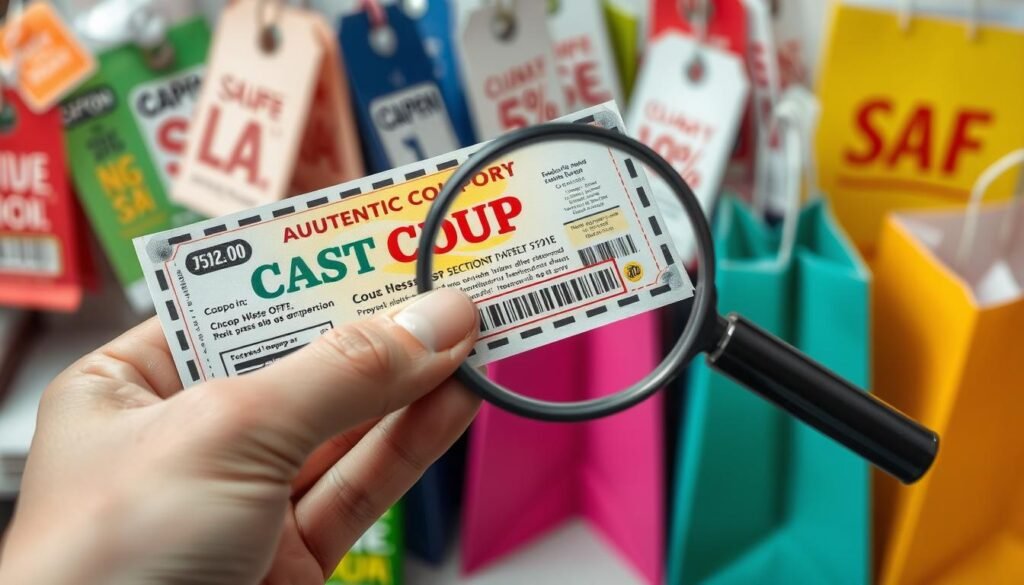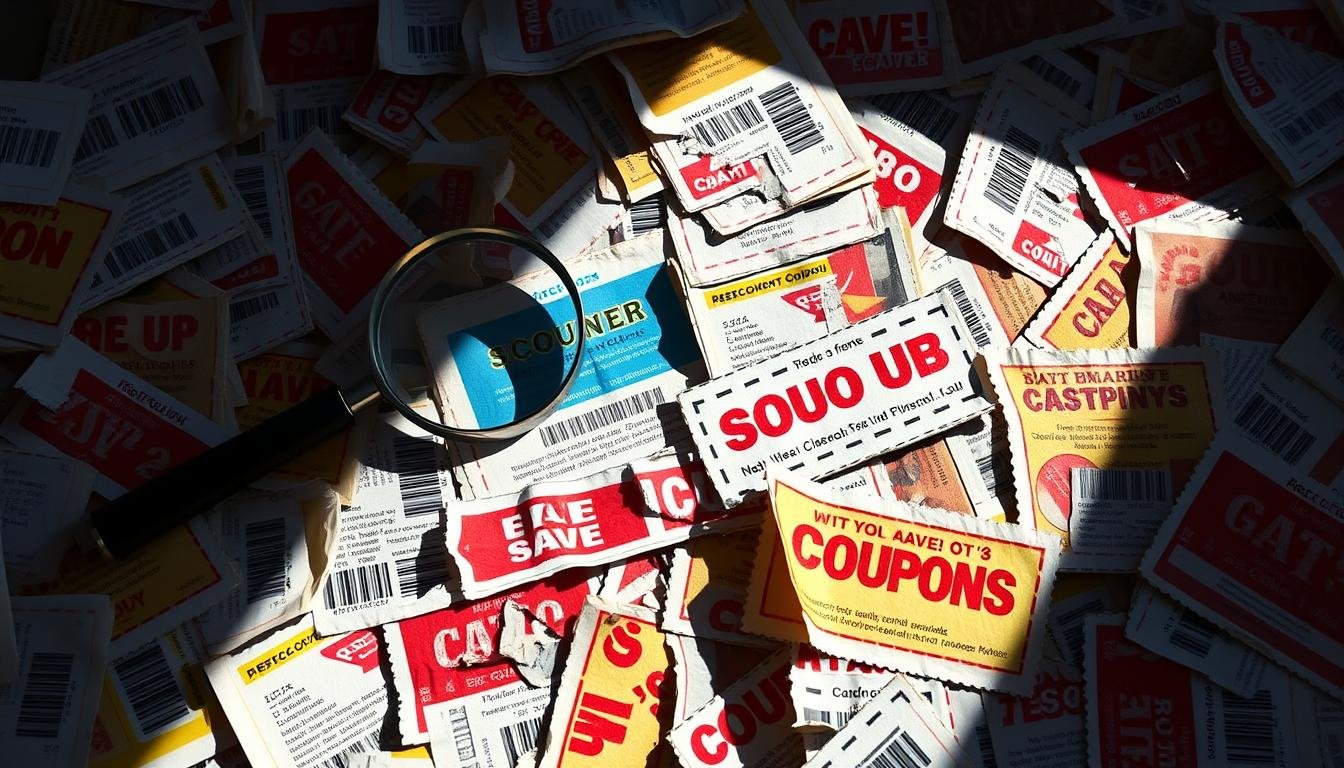Online shopping is getting more popular, but it also brings risks. Counterfeit coupons and discount scams are on the rise. These scams can cost you money and steal your personal info. This guide will teach you how to avoid these scams and shop safely.
Key Takeaways
- Understand the dangers of counterfeit coupons and discount scams, including their impact on consumers and businesses.
- Learn to identify common types of coupon scams and how to verify the legitimacy of promotional codes and discounts.
- Discover the red flags that indicate a coupon is fake and how to protect your personal and financial information during online transactions.
- Explore steps to report coupon fraud and scams, as well as trusted sources for authentic coupons and discounts.
- Recognize the tactics used by scammers and develop a critical eye for manipulative marketing strategies.
The Dangers of Counterfeit Coupons and Discount Scams
Shopping and saving can be tempting, but beware of the risks. Counterfeit coupons and discount scams can cause big problems. They can lead to financial losses and more.
Understanding the Impact of Coupon Fraud
Falling for coupon fraud can hurt a lot. You might lose money and even face legal trouble. Stores and brands lose money and trust when people use fake coupons.
Common Types of Coupon Scams to Watch Out For
Stay alert for discount scams. Here are some common ones:
- Phishing schemes try to steal your personal info with fake deals
- Counterfeit coupons look real but are scams to cheat both you and stores
- Bait-and-switch tactics promise deals but then try to sell you something more expensive
Knowing about counterfeit coupons and discount scams helps you stay safe. It keeps you from falling into these traps.

How to Identify Authentic Promotional Codes and Discounts
Looking for deals and saving money is easier with promotional codes and discounts. But, it’s important to know the real offers from the fake ones. Checking if a coupon source is legit is crucial for safe savings.
Verifying Coupon Sources and Legitimacy
To spot real promotional codes and discounts, here are some tips:
- Check official brand websites – Real codes often come from the brand’s site or social media.
- Explore reputable deal sites – Look for trusted sites that offer real coupons.
- Read customer reviews – Watch out for sites with complaints or fake code reports.
- Avoid suspicious-looking websites – Stay away from sites with bad design, pop-ups, or personal info requests.
By using these tips, you can find authentic promotional codes and check if coupon sources are real. This way, you stay away from fake coupons and shop online safely.

Spotting the Red Flags: Signs of Fake Coupons
Identifying fake coupons and avoiding discount scams is key. Knowing the signs of counterfeit coupons helps keep you safe. This way, you can avoid falling into their traps.
Low-quality printing is a big giveaway of a fake coupon. Real coupons look sharp and clear. Fake ones might be blurry or have weird patterns. Also, real coupons have special features like watermarks or microprinting that fakes don’t.
Be wary of coupons with odd terms or restrictions. Counterfeit coupons often have unrealistic expiration dates or apply to too many products. They might also use unclear language.
- Beware of coupons that seem too good to be true, as they may be part of a discount scam.
- Carefully examine the coupon’s design, layout, and overall quality to identify any inconsistencies or irregularities.
- Cross-reference the coupon details with the issuing brand or retailer’s official website to ensure authenticity.
Stay alert and know the signs of fake coupons. This way, you can dodge counterfeit coupons and discount scams. A bit of caution can save your money and shopping joy.
Online Shopping Security: Best Practices for Safe Transactions
Online shopping is now a common and easy way to buy things. But with more online scams, keeping your info safe is key. By following some important steps, you can get real deals and keep your personal and financial details secure.
Protecting Your Personal and Financial Information
To keep your online shopping safe, take these steps:
- Use Secure Payment Methods: Choose trusted payment options like credit cards or digital wallets to lower fraud risks.
- Avoid Suspicious Websites: Be careful of unknown sites or those with bad reputations. Always shop from well-known retailers and online stores.
- Monitor Account Activity: Check your bank and credit card statements often for any odd charges. Tell your bank right away if you find something wrong.
By following these online shopping security tips, you can protect your consumer protection. This way, you can shop online safely, even when using real coupons and discounts.
How to Spot Fake Coupons and Avoid Scams
In today’s world, fake coupons and scams are everywhere. They can cost you money and even steal your identity. It’s important to know how to spot counterfeit coupons and avoid discount scams.
Start by checking where you got the coupon. Look for coupons from trusted sources like real retailers and websites. Coupons from social media, emails, or unknown sites are often fake and part of a scam.
Also, look at the coupon’s details. Real coupons have barcodes, expiration dates, and security features. If a coupon looks too simple or is missing these, it’s probably counterfeit.
Be careful of discount scams that offer huge savings or ask for personal info. Always read the fine print before using a coupon. If a deal seems too good, it probably is.
By being careful and following these tips, you can avoid fake coupons and discount scams. This way, you can shop safely and enjoy your purchases.
Consumer Protection: Reporting Coupon Fraud and Scams
It’s key to report coupon fraud and scams to protect consumers. By staying alert and acting fast, we can avoid falling into these traps.
Staying Informed and Raising Awareness
Knowing the latest coupon fraud and scam tricks is vital. Check out the Federal Trade Commission (FTC) and local agencies for scam updates.
Also, tell your friends and family about these scams. This way, we can all help keep our communities safe from coupon fraud and scams.
If you think you’ve seen a fake coupon or scam, report it right away. Contact the FTC or your local consumer protection agency. They can help stop more scams and protect us all.
- Stay informed about the latest coupon fraud and scam tactics
- Check reputable sources like the FTC and local consumer protection agencies for updates
- Share knowledge with friends, family, and fellow shoppers to raise awareness
- Report suspected fake coupons or scams to the FTC or your local consumer protection agency
By being proactive, we can all help keep our shopping safe. This way, we ensure a better experience for everyone.
Trusted Sources for Legitimate Coupons and Discounts
Finding real coupons and discounts online can be tough. But, there are trusted places to find safe and real savings. By checking coupon sources and following safe online shopping tips, you can save more without falling for fake coupons or scams.
Looking for authentic promo codes? Check brand websites first. Many brands offer special deals on their sites. Also, sites like RetailMeNot and Coupons.com check their coupons, making them safe to use.
- Official brand websites for authentic promotional codes
- Reputable deal sites that verify coupon legitimacy
- Signed up for newsletters from your favorite brands to receive exclusive offers
When shopping online, be careful where you get your coupons. Don’t trust offers that seem too good to be true. Stick to verified coupon sources and know the signs of fake coupons for a safe shopping experience.
Use these trusted sources and follow safe online shopping tips. This way, you can get real promo codes and discounts with confidence. You’ll save more without worrying about scams.
The Psychology Behind Coupon Scams: Understanding the Tactics
Coupon scams use tricks to get people to fall for them. Knowing these tricks can help you avoid falling into their traps. This way, you can spot fake coupons and stay safe from scams.
Recognizing Manipulative Strategies and Emotional Triggers
Scammers play on our emotions and biases. They might say a deal is about to end to create urgency. Or, they might say it’s only for a few to make you feel like you’ll miss out.
They also offer deals that seem too good to pass up. This makes it hard to say no. They use immediate gratification to get you to act fast.
Another trick is to make you think something is rare. They say it’s in high demand, making you think it won’t last. They might also say it’s popular or endorsed, even if it’s not true.
- Urgency: Scammers create a sense of limited-time offers to pressure consumers.
- Fear of Missing Out: Scammers suggest exclusive deals to trigger the fear of missing out.
- Immediate Gratification: Scammers offer tempting discounts for quick decision-making.
- False Scarcity: Scammers claim coupons or discounts are in high demand and won’t last.
- Social Proof: Scammers claim popularity or endorsement to build trust.
By knowing these tricks, you can stay alert. This helps you avoid falling for scams and spotting fake coupons. It keeps you safe from discount scams.
Ethical Coupon Practices: Promoting Fair Play
In the world of retail and online shopping, it’s key to promote ethical behavior. This includes how we use and share promotional codes and discounts. Everyone involved—consumers, retailers, and coupon providers—must work together to keep things honest and fair.
For shoppers, practicing safe online shopping practices is vital. It’s important to check if promotional codes are real before using them. This way, shoppers avoid supporting scams and stay safe online.
Retailers also have a big role in consumer protection. They must have strong security, clear coupon policies, and handle fraud quickly. This helps build trust and ensures a fair shopping environment for everyone.
